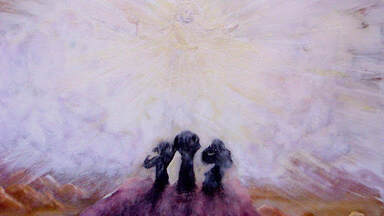 Young at Heart Message Today is the last Sunday in the season of Epiphany, and it is also known as Transfiguration Sunday. I find that a lot of people don’t really understand the Transfiguration, and I will admit that it can be hard for pastors to explain as well. So I thought I would try to creatively elaborate on the scripture story we heard so that we might understand it better. This story is adapted from Gary Neal Hansen’s blog, garynealhansen.com. Here is what happened on the mountain that day… One day, Jesus and his friends were camping at the bottom of a mountain. Jesus said, “Hey! Peter, John, and James – come with me!” Peter asked, “Where are we going?” “We’re going for a hike together,” Jesus said. “Just the four of us. Up this mountain.” “Oh man,” said Peter. “Do we have to? I was looking forward to just relaxing today.” “Look Peter,” Jesus said. “I want to go up there and have some good prayer time. It’ll be like a little retreat. And I want you three with me because you’re my closest friends. OK?” “Alright,” Peter said. So they headed up the trail. After a while, when they were pretty high up on the mountain, Jesus said, “This looks like a good place. You guys wait over there while I pray, OK?” James said, “Boy, I’m tired after hiking all the way up here. I think I’m going to take a nap while you pray.” But Jesus said, “I’d rather you all stayed awake. Hey, I know! How about you pray, too?” “Okay,” James said. “But I don’t know much about praying.” “Oh,” said Jesus. “Well, I’ll teach you more about praying another time. For today, just watch me.” So they all tried to stay awake and watch Jesus. While they watched, some very surprising things started to happen. First, Jesus seemed to shine with light. Then his clothes became blindingly bright. He was like the sun on a summer day! Peter, James, and John shielded their eyes from the glare, but they kept watching. Suddenly they saw that Jesus wasn’t alone. Two other men were standing there, talking to him. “Who are those guys?” asked Peter.
“I don’t know!” said John. “Let’s listen and see if we can figure it out.” They missed the start of the conversation, but one of the strangers said, “It will be kind of like the first Exodus – when I led the people of Israel out of slavery in Egypt.” “Right!” said the other one. “You parted the waters of the Red Sea. Just like later, when I parted the waters of the River Jordan!” “Hey you guys,” said Jesus. “You know it wasn’t really you parting the waters!” “OK, fine,” said the first guy. “God did the miracle. But I had to be there and raise my staff, and I had to have faith in God helping us.” “Yeah,” said the second guy. “God parted the waters, but I had to smack the river with my cloak.” “Hey!” said John. “That must be Moses and Elijah!” “That’s right!” said James. “Moses led the Exodus of Israel through the Red Sea, and Elijah parted the River Jordan!” “Shhh,” said Peter. “I want to hear what they’re saying.” “Okay,” said James. “But don’t be so bossy.” “The point,” Moses told Jesus, “is that you’re leading an exodus, too – a NEW exodus. What you do in Jerusalem will lead the people out of their slavery to sin.” “Right,” said Elijah. “You’ll lead them through the waters to freedom.” “Waters?” said Jesus. “Am I supposed to part the Sea of Galilee or something?” “No,” said Moses. “They’ll all go through the waters of baptism.” Just about then Peter stood up and said, “Wow Jesus! This is so cool! You know what we should do? We should build three little houses, you know? One for each of you. Then you could live up here, and the people could come up and talk to you about their problems! If they get sick, you could heal them. Or if they don’t understand the law they could ask Moses! I mean, he wrote it, right? And if they’re worried about the future they could ask Elijah, because, you know, he’s a prophet!” John started tugging Peter’s sleeve. “Peter! Sit down!” he said. And honestly, Peter didn’t know what he was talking about. He, John, and James were terrified of all that had happened, and in his fear, he thought staying on top of the mountain would be easier and less scary than doing the work Moses and Elijah had given Jesus to do. But then a thick dark cloud rolled in on the mountain. Everything got so foggy that Peter, James, and John couldn’t see a thing. And from the middle of the cloud came a voice: What you should really do is listen to Jesus! He’s my son! Jesus is my chosen one! But then the cloud cleared—and Moses and Elijah were gone. It was just Jesus. And Jesus looked normal again. They went back down the mountain. But they didn’t tell anybody what they’d seen. Not for a long time. The Message So, the Transfiguration is clear as mud now, right? It is important to note that just prior to today’s scripture reading, Jesus was teaching the disciples a hard truth about the cost of discipleship. He was predicting his own suffering, death, and resurrection. And this had already increased fear among the disciples. And then this experience of blinding light and seeing figures from the past happens. So it makes sense that the disciples who saw this were afraid. Peter’s suggestion that they pitch tents and just stay on the mountain forever was prompted by his fear – fear of what just happened, but also fear of losing Jesus. If Jesus could stay on that mountain top with Moses and Elijah, protected and safe, then perhaps his death would not come in the way he predicted six days prior. But of course, Jesus knows he must move forward. His disciples may be afraid for him, but he is not afraid of his imminent death. And I’m not sure that his disciples are as afraid of Jesus’s death as they are of the change that his death would bring. Jesus leaving them would mean they would lose their teacher. And, perhaps more importantly, it would also mean they would have to do the work Jesus started. We are all human here, and we know what this is like. When someone who had done hard work for us leaves or passes away, it can be daunting and overwhelming to try to take over that work on their behalf. In this case, it wasn’t hard labor or task-oriented work the disciples would have to take over. It was a call from God. It was service to God in Jesus’s place. And that was scary. It would be a huge change for them. We can imagine what this might have been like, because it is human nature to resist change. We don’t like it when things change around us, and we especially don’t like it when we are forced to change ourselves. And the disciples were no different than we are today. We are no different than they were. Sometimes, we know we need to change. And sometimes, change is forced on us. We may want to be like Peter – grasping at anything to try to keep things the way they are right now. And yet, we are pushed toward the future – toward change and uncertainty – out of necessity. We can only move forward if we are open to the possibilities of change. This is true for us personally, and it’s true for us as a church family. This church has been in transition and going through change for several years now. And it may feel like we’re past that, and that things will settle down. I hope that is true! But I also hope that we don’t try to pitch our tents on top of the mountain and hold onto this present moment when God may be calling us to continue moving forward and looking to the future. What does that future look like? Well, we aren’t Jesus, so we can’t predict what our future looks like. But we can be open to possibilities, open to change, and excited for the future. We can watch and listen for God’s guidance, and when we feel the push for something new and different, we can choose to lean into that nudge with joy and grace. May we continue to move forward, and may we find joy in change and transformation, both in our individual lives, and in the life of our church. Amen. Let us pray: Gracious and loving God, there are often times when we would rather do like Peter suggested and pitch our tents in the present moment, holding on to feelings of happiness, joy, or contentment, and avoiding the unknown future. But God, we pray for your wisdom and guidance in these moments, and your encouragement to keep moving forward, unafraid of what the future holds for us. Spark in us a flame of excitement for the future, and courage to walk into the unknown with the assurance that no matter what the future holds, you will be walking with us, holding our hands when we feel unsure, and carrying us when we feel weary and ready to turn back. All of this we pray in Your name. Amen.
0 Comments
 The Message In today’s scripture passage, we hear the story of the first person that Jesus heals in the Gospel of Mark as part of his early ministry. Before we get into the nuts and bolts of this story, I want us to define a couple terms first. Can anyone define the word “cure” or ”curing”? What about the word “heal” or “healing”? Is there a difference? The actual definition of cure is “to relieve (a person or animal) of the symptoms of a disease or condition.” And the actual definition of heal is “to become sound or healthy again, or to alleviate a person’s distress or anguish.” These may seem like subtle differences in the definitions of these two words, but in practice, we conceive of these words quite differently. For example, imagine a woman named Sally. Sally prays diligently every day. She prays for specific outcomes for health and healing, both for herself and for others. She knows other Christians who testify to God’s healing in their own lives, and of course the Bible describes Jesus as an amazing miracle worker, just like he is described in the Mark passage we read today. But, despite her persistence and diligence, her prayers often go unanswered. She prayed for her grandparents and prayed that they would be cured of all that ailed them, but they passed away from their ailments. She asked God to cure the relationship between her sister and brother-in-law, but they ended up divorced. She prayed that God would help cure hunger and disease in poverty-stricken places, but hunger and disease persists all over the world. Sally began to keep track of her prayers, and started to note those that were answered and those that weren’t, and she started to notice a disheartening pattern: The majority of her prayers for specific outcomes for healing or curing herself or her loved ones were not answered. This realization pushed Sally almost over the edge, to the point where she felt that prayer may not be a useful tool for her faith anymore. She still had faith, but wasn’t sure that prayer did much good, and she had proof that it didn’t seem to change outcomes, at the very least. Sally’s friends at church tried to explain by saying things like “it’s just part of God’s plan” or “it makes you appreciate your own health and wellness even more,” or “God is building character by allowing these things to happen.” Some people even blamed demons or Sally’s own lack of faith for her unanswered prayers. People pointed to biblical statements about the faith of those that Jesus heals. They implied that those who were not healed simply did not believe, or did not believe strong enough, or hard enough. But Sally felt even more discouraged by these comments and ways of seeing prayer because she did believe, and she prayed hard. She believed in Jesus’s stories of healing and miracles, and she had faith in God. So why weren’t Sally’s prayers being answered? Why did her prayers seem to go unanswered more than they were answered? It’s of course hard to answer this question with certainty because it’s a hypothetical, fictional scenario. But, I do think many people have similar questions about prayer, about healing, and about Jesus’s promises to heal the sick and demon-possessed. But, what if we are looking at these stories of healing with inaccurate assumptions? First of all, we tend to assume that use of the word “heal” automatically means “cure.” We assume that Jesus casting out demons means he cured the person and there was nothing left for the person to do on their own to heal or integrate back into society. We also tend to overlook parts of these stories like, for example, subtle cues in today’s passage. We heard in the translation we read today that Jesus “healed all kinds of terrible diseases and forced out a lot of demons.” It does not say Jesus healed every single terrible disease, nor does it say that he cast out everyone’s or all demons. Even Jesus could only do so much. The passage says that all who were sick or had demons were brought to Jesus, but it also says “in fact, the whole town gathered around the door.” Are we to assume then that the entire town had some kind of affliction or illness or demon that needed to be healed or cast out? Our assumption when we read stories like this is that Jesus cured every person with any kind of affliction. Then, when we turn to prayer in our lives today, we assume based on these stories that God is able to cure every affliction we or others have today. But our assumptions in the scriptures may not be accurate. Jesus is only able to do so much. In fact, in Mark 6: 1-6, Jesus goes to Nazareth and is able to perform some miracles but not others. What if, when the Bible talks about healing, it is not always talking about curing every affliction? What if, instead, we expand our assumptions and our own definitions of healing beyond specific outcomes? For example, what if Sally prayed for her grandparents in such a way that would open her mind to the ability to see her prayers being answered because she stopped trying to control the outcomes? Instead of praying for her grandparents to be cured of all their ailments, Sally might have prayed that they healed mentally, spiritually, and emotionally and that God would be by their sides as they navigated the waters of illness, age, and physical decline. If we expand our assumptions when we read these healing stories in scripture, we can go beyond Jesus simply curing physical or mental ailments, and we can move instead toward Jesus providing mental and spiritual wholeness and healing, regardless of the physical, bodily outcome. If we can understand these stories of healing not necessarily as purely curing, but as healing of mind, body, and spirit, then we can move beyond specific outcomes of curing into thinking about wholeness and wellness differently. And if we can think about healing this way in scripture, we can also think about healing differently in our everyday lives as well. I heard an amazing speech once given by a woman who had a chronic illness. She said to her audience that she didn’t want their prayers that a cure would be found for her illness. What she wanted was prayers for healing and wholeness, acceptance of her disease, and an understanding of how she could navigate in an able-bodied world. She didn’t want pity, and she knew that prayers for a cure would go unanswered because science hadn’t gotten that far yet. It wasn’t hopeless. It was realistic, and she knew that any prayers for her healing had to accept her situation as it was. And she was OK with it! It just meant she needed to navigate her world differently, and accepting that fact allowed her to move toward wholeness in ways that many of us who are able-bodied aren’t able to do. I think Jesus moves us toward healing in far more ways than simply physical, bodily healing. Jesus healed people, yes. But that healing was much more than surface-level. It was more than the healing we could see on the outside. God wants to see us healed, and God wants to heal. And sometimes, miracles do happen. The Good News of today’s message is that healing can happen even if physical curing is not possible. Rethinking our assumptions can help us better understand the difference between being cured and being healed. And my hope, for you as individuals, for our church community, for your families, for our local community, for our nation and for our world is that we can move toward healing and wholeness rather than focusing solely on curing our ailments. May we be open to expanding our minds and our hearts to a wider, deeper understanding of healing that goes beyond bodily cures and moves us toward wholeness. Amen. Let us pray: Healing God, today we pray with gratitude that you have given us our lives and this community as a network of support, love, and compassion that sustains us through life’s challenges. We ask that you continue to guide us toward health and healing, even if a cure for our ailments is not yet possible. We seek a deeper understanding of healing that goes beyond our physical bodies and reaches deep into our souls. In your holy name we pray, amen.  Young at Heart Message You know what? It has been a long week. Getting back from vacation is almost harder than going on vacation! I think I might actually lie down and take a quick cat nap. Hope you’re all OK with that… … … … [Man’s voice, softly]: Jamie… … Wha…? What was that? Did someone call me? I’m here – what is it? No one called me? Strange… Oh well, back to napping… … … … [Man’s voice, a little louder]: Jamie! … Who said that? I’m right here – what is it? No one called me again? I must be dreaming… … … … [Man’s voice, louder still]: JAMIE! OK, if none of you are calling me, then there’s only one other thing it could be… God must be scolding me for sleeping on the job! I guess I’d better get up and do what God is calling to me do! The Message All right, I know that was another silly way to demonstrate the scripture reading today. But, I love this passage. I was really excited to preach on this passage on the 14th, but then we canceled church due to the frigidly cold temperatures, and I missed my chance to do this silly recreation. So, I figured why not do it today instead? It’s not very often that I preach from the Hebrew Bible, or Old Testament. I usually try to stick to Jesus’s examples because there is so much to learn from Jesus and his followers. But, there are lessons to learn from these older scriptures too, and today’s passage is a good one. The passage starts out by telling us that we are hearing the story of Samuel, an aid to the priest Eli, who is most likely older, and who we know is going blind. The scripture then tells us something interesting. It says, “in those days, the Lord hardly ever spoke directly to people, and he did not appear to them in dreams very often.” This is a curious statement, because many of the stories in the Hebrew Bible do involve direct communication with God in some way or another. There are a lot of signs and conversations directly with God that we don’t see much at all once Jesus appears in the New Testament. So, this line places us in context so that we can understand why Samuel is confused when he hears someone calling him, and Eli says it wasn’t him. Samuel probably starts to think he’s going a little crazy – either that, or Eli is losing his mind! What’s particularly interesting here is that Eli doesn’t recognize what’s happening sooner. Eli is a man of God, and we understand that he had been doing that work for quite some time. So it’s interesting that he did not recognize sooner what Samuel was experiencing. Eli eventually does figure it out, and tells Samuel to speak directly to the Lord next time he hears his name called. Finally, the last line we heard today was Samuel saying to God “I’m listening. What do you want me to do?” I chose to end the passage here because I want to talk about the ways we are called – ways that may or may not be as obvious as God speaking directly to Samuel. I’ll start by sharing my own example. As most of you who were here on my first Sunday at Good Shepherd know, I left the church for many years before returning. And my return to church wasn’t compelled by a voice from God telling me to go back to church. I was invited back to church by my ex-husband. And I will admit that I was hesitant to go back to church at all, but sometimes we do things for other people even if it’s not something we would normally do on our own. But that invitation created a tiny snowball that eventually started to roll and gather more and more snow until it turned into a snow boulder that I could no longer ignore. God very well might have been calling my name, but that call did indeed come through someone else and not as a voice from God directly. Going back to church sparked curiosity for me again about Christianity, and I realized how little I knew, and I started to want to learn more. So, I started exploring seminaries with no intention of becoming a pastor. My only goal was to learn, and I figured I might as well get a Master’s degree while I did. Was God gently calling my name already then, and I was following that call under the guise of my own curiosity? I suspect so. After about two years of seminary, I started to think welllll, maaaaybe I could go into church leadership. I started seeking out denominations and quite literally stumbled across the Moravian Church, after trying to connect with two other denominations who simply never called me back. Once I got connected to the Moravian Church, the snowball was rolling so fast and collecting so much snow that I definitely couldn’t ignore it any longer. It may have been then that God was practically yelling my name and I was finally ready to say, “I’m listening. What do you want me to do?” But it took me a long time to realize those nudges were a call from God. I must not have been totally asleep, because I kept putting one foot in front of the other. But it took a long time and a lot of nudging to get me to stop dragging my feet, open my eyes, and to say “OK God, I’m listening. What’s next? Where do you want me to go?” And, hearing the call and acting on it were two very different things. For me, being willing to say “God, I’m listening” was hard, not for lack of desire to listen, but because the logistics of doing that were challenging. It wasn’t as easy as just dropping everything one day and picking up God’s call the next. It was a lengthy, arduous process that took daily work, tons of conversations, significant help from my network and community, and organization of many moving parts. This passage from 1 Samuel makes it sound easy to just hear what God is telling us, and obediently follow. But I think we all know that life is not always set up to act on a call from God without sacrifices, challenges, delays, frustrations, and a lot of uncertainty. And yet, sometimes God is persistent. Sometimes we want to lie down and nap, and God whispers (or yells) into our ears. Sometimes we start to move forward on something we’re called to do, and something stops us. We get tired, or we think we don’t have the means or the resources, or we think what God is asking of us is beyond our reach. But God calls again, a little firmer this time. And still, we might struggle. Or we might move ourselves forward a bit, but then feel like we might need to lie down and rest again. And when God continues to nudge, to push, to call our names in the night, it is not always an easy ask. It takes work. It can mean starting and stopping, trying and failing, making mistakes, taking wrong turns, and tremendous uncertainty. And through all of it, God continues to guide us so we can fulfill our call. This story of Samuel and Eli gives us pause to think about those times in our lives when we’ve been called for something. We are reminded of the people along our way who said, in one way or another, “it’s God calling – open your heart and listen.” And it gives us pause to look at our lives as they are right now, and to ask if God is calling us for anything right at this moment. What push do we need to start putting that call into action? What courage do we need to say “Here I am Lord. I have heard you calling in the night. I will go Lord, if you lead me”? Samuel demonstrated that courage for us today. As you leave this sacred space, hold these questions in the back of your mind: - When God calls you, how do you know? Who or what does God use to speak to you? - Is there anything God has been calling you to do, or say? Is there anyone God has been calling you to forgive, or to learn more about, or to better understand? God invites you to do like Samuel did and set aside your uncertainty or fear of the unknown so that you can do what you’re called to do. The Good News from Samuel’s story is that God will guide you on the path you’ve been called to walk. Not only will God guide you, but God will walk that path – into the weeds or the thorns or the quicksand or whatever else stands in your way – and God will be there with you as you forge ahead to answer the call. Amen. Let us pray: God of love, grace, and mercy, we come before you today first and foremost with gratitude. We are grateful that you do not give up the first time you call us to serve you, but that you persist in calling us and guiding us in the direction you wish for us to go. We know we do not always listen or understand your call at first, but we are grateful you continue to pursue us, support us, and open doors for us along the way. With gratitude, we pray in your name, Amen.  The Message How does a weary world rejoice? This week is the last week in our sermon series addressing this question. And in this final week, we answer this question with “we root ourselves in ritual.” As I was thinking about the theme this week and reading the scriptures, I realized that, at least for me, it doesn’t feel like rooting myself in ritual would help me rejoice through my weariness. And this could be partially because I just moved here not too long ago, and this was my first Christmas in a totally new place and with a totally new church, and it just didn’t feel like I’ve established any rituals yet. But as I thought more about it, I realized that I actually do root myself in ritual, often without even realizing it, if we can expand on our definition of ritual for a moment. When I go to bed at night, I always get into bed on the same side, and I stay on that side all night, even though the rest of the bed is empty – except of course when Kanyon decides to sleep on the bed, too. When I wake up in the morning, I always get out of bed and immediately tidy up the side of the bed I slept in. I prepare myself to take the dogs outside, and then I take them outside using the same morning ritual every day. Partially I do this for the benefit of my dogs – they know what to expect if we do things the same way every day. But, they’re adaptable. Mostly, I do these rituals for myself. I can be on autopilot if I maintain a morning ritual that makes sense to me. After I finish with the dogs, I go to the bathroom, and brush my teeth. I don’t know if you all do this too, but I use the same pattern for brushing my teeth every single time I do it. If for some reason that pattern would change, I would feel so strange that I am not even sure what I would do! At this point, my morning ritual might change depending on what my day looks like. But even still, there are so many things that I do throughout the day in exactly the same way every time I do them. And I realized as I was thinking through this notion of rooting ourselves in ritual, that we likely do this because it helps us feel comfortable and safe. It also helps us to be able to let go of putting a lot of effort into thinking too much about things that we can put onto autopilot. I never think about which leg to put into my pants first when I put them on. To be honest, I am not even sure which leg I do first, but I am sure I do it the same way every time and I don’t even realize it. So, even on a very basic level, there is comfort and possibly even joy in the very simple rituals we perform on a regular basis. But of course, when we talk about ritual, especially as it relates to religious or spiritual rituals, we are typically referring to something very different. And yet, also similar, at least in terms of how religious or spiritual rituals make us feel. In our scripture today, we heard that eight days after Jesus was born, his parents participated in a naming ritual. Then, following the ritual demanded by the Law of Moses, they “took Jesus to the temple in Jerusalem and presented him to the Lord.” They then offered a sacrifice on his behalf. It might be hard for us to relate to this ritual today, or to understand how participating in it helped them to find joy. But when we think about other religious rituals that we participate in that help ground us in our faith, or bring comfort when we are troubled, or simply bring a sense of nostalgia, comfort, and safety, we can see why and how these types of rituals benefit people – then and now. How thrilled would we all be to witness a baptism in our church? That would be amazing, and there would be tons of joy – not just for the parents, but for all the members of our church. When we accept the grace of God and remember the sacrifice of Jesus through Holy Communion, it can bring a sense of joy and peace to many who participate. But, even if sacramental rituals do not do much for you personally, most of us feel comforted by the ritual of a candlelight Christmas Eve service. Or, we feel comforted by reciting the Lord’s Prayer, which is another ritualized prayer that is almost on autopilot for those who learned the prayer as a young person. Religious rituals are fascinating because often, we find them so meaningful, or we feel so attached to them, that we struggle to change them or adjust to something new. I have a hard time when other churches recite the newer words to the Lord’s Prayer. I learned “forgive us our trespasses as we forgive those who trespass against us.” When I hear another version – “forgive us our sins as we forgive those who sin against us,” or something different, my brain can’t adjust very easily. And yet, if that was the version this church used regularly, I would accommodate and change my ritual. So, I would encourage you to think through your own rituals – both personally and spiritually. What rituals are meaningful to you? Have any changed over the years? Are there any you miss or long for? Sometimes, we don’t even realize a ritual has changed until we are taken back to it somehow, and we fall into a comfortable pattern that we haven’t been in for years. This happened to me during COVID when my grandmother passed away. I went to her funeral, which was held in a Catholic church. I will admit that there are things I do not necessarily appreciate about the Catholic church. But, there are things that I very much loved about being at her funeral, and many of them had to do with the rituals that I remember from my childhood in the Catholic church. Even though I wasn’t magically convinced to switch denominations permanently, I felt a sense of calm and peace and yes, even joy, when I was taken back to some of those Catholic rituals I learned and witnessed as a kid. Those rituals helped with my grief, they helped me to feel connected to my grandmother and my family, and they helped me to find a sense of peace and joy, even through the sadness and the weariness of losing someone I loved dearly. So rituals are important, and in times of need or times of distress, overwhelm, or weariness, we tend to fall back on our rituals. I did not realize how many rituals I participate in, both on a personal level and on a spiritual level, on a daily basis. But, now that I have thought through it a bit, I do realize how much rituals and patterns of behavior affect our daily life. I can see how rooting ourselves in these rituals of spiritual or personal comfort can be helpful when we become overwhelmed. I can also see how it might be easy to root ourselves in unhealthy rituals or patterns of behavior as well. So, as you leave here today, I encourage you to become more aware of the rituals you participate in regularly. Recognize those rituals that bring you life and energy, and become aware of those that might drain life or energy from you as well. And then, bring those that give you life and energy to the front of your consciousness when you feel weary, run-down, or overwhelmed. Learn to rejoice through use of rituals that bring life and energy to your spirit. Sing praise to God for the joy that these rituals bring, and experience joy through the process. So, how does a weary world rejoice? We acknowledge our weariness. We find joy in connection. We allow ourselves to be amazed. We sing stories of hope. We make room. And we root ourselves in ritual. May you leave here today armed with tools to help you rejoice through your weariness, and to help others do the same. Amen. Let us pray. God of hope and joy, today we are grateful for the lessons in the Gospel of Luke that help equip us with ways to rejoice in a weary world. We ask for your guidance and wisdom in helping us to find out own ways to rejoice and experience joy through our weariness as we move through our own lives. God, sometimes we don’t even recognize how weary we are, so we ask that you would help us to acknowledge our weariness when we are struggling to see and know it. We are grateful for the people around us who are there to provide connection, and we pray that you would guide us to community when we feel weary and need to find joy in connecting with others. We ask that you help us to allow ourselves to be amazed - that you would help us not to forget to take the time to see and know the amazing things around us. And we ask that you would help us to sing our stories of hope. God, we also need your help to make room - for you, for Jesus, for other people, and for ourselves. Finally, God, we thank you for helping us root ourselves in rituals. We thank you for the rituals we learned as young people, and for the more recent rituals that help us experience joy and give us life and energy. God, you amaze us every day, and our gratitude is eternal and unending. We pray all of this in your name. Amen.  The Message There are many lessons in the Christmas story. We can, and often do, preach on these verses in the Gospel of Luke every year at Christmas, and each year, we could say something different about it. This year, I want to talk about hospitality. For those of you who have not been to our Advent services, we have been addressing the question, “How does a weary world rejoice.” The first week of Advent we talked about acknowledging our weariness. After that, we talked about finding joy in connection, and then allowing ourselves to be amazed. This morning, we talked about singing stories of hope. And tonight, we’re going to talk about making room. Opening ourselves to the presence of God and welcoming Jesus into our hearts. We’ve read Chapter 1 of the Gospel Luke in its entirety, and we’ve heard the story of Zechariah and Elizabeth and the miraculous conception of John the Baptist. We’ve heard the story of Mary, an unmarried virgin, who becomes pregnant by the Holy Spirit. Through both of these stories, we have heard about the radical hospitality that these people demonstrated. Elizabeth and Zechariah made room in their hearts for a child – a child they believed impossible. They had closed their hearts and their minds to the possibility of ever having children. Their hearts had hardened, they’d built walls to protect themselves and to try to overcome their shame and their guilt. But as soon as they learned that they would be blessed with a pregnancy, those walls around their hearts began to crumble and they made room for their son. They also made room for each other – they shared their joy and their grief over the years that they waited in shame and frustration and sadness. Meanwhile, Mary, unmarried but engaged to Joseph, was given the news that she would conceive miraculously through the Holy Spirit. Without hesitation, she made room in her heart for the movement of the Holy Spirit, for her new son, and for all the challenges this miraculous virgin birth would bring for her. Likewise, Joseph - a man engaged to a woman who becomes pregnant before their wedding and without him - could easily have decided to cast Mary and her baby aside. But he did not. He demonstrated tremendous love and trust for Mary and her son, and he made room in his heart, which must have been hurting at least a little bit. And then today, we hear how room was made on a bed of hay for Mary to give birth and for the baby Jesus to lie his head. We also heard how quickly the shepherds made room in their busy lives dedicated to their flocks to go and see the new baby that the angel told them about. You see, this entire story is a story of hospitality and making room. Despite their weariness, their shame, their guilt, their busy-ness, or the walls they’d built in their hearts, all of these people made room for the Son of God. This story then begs the question: do we make room in our own hearts? In our own lives? We are called to make room for the lonely. The hungry. The poor. The downtrodden. We are called to make room in our hearts for the stranger sitting next to us. The stranger on the street corner. The exasperated mother at the grocery store or the family next door that is struggling to make ends meet. We are called to make room for the Son of God in our hearts, our homes, and our lives. We are called to make room even when it’s inconvenient for us, when we have our own troubles and our own worries. We are called to hospitality, and these stories remind us that we are better able to make room in our hearts when we do these things in community with others. We are not on our own. The beauty of a church community is that we are surrounded by people who care about us, who love us, and who regularly make room for us. And, within that community, we love and support and lift each other up in and for Jesus Christ. Tonight, we celebrate the birth of Jesus. And in doing so, we invite hospitality and we make room in our hearts. As we turn down the lights and sing Silent Night at the end of the candlelight service tonight, I invite you to think about how you can make room in your own hearts so that, through your own weariness, you are able to rejoice. How does a weary world rejoice? We acknowledge our weariness, find joy in connection, allow ourselves to be amazed, sing our stories of hope, and we make room. Make room for love, make room for light, make room for your neighbors, your family, and your friends. Make room for each other. Make room for the ones who cannot be here with us tonight. Make room for those who feel they have no choice to but to do it all on their own. And make room for Jesus. He is the light of the world, and we can rejoice through our weariness knowing that He was born because so many people made room for Him. And He always makes room for us. Amen. Jesus, thank you for being our light in the darkness. Thank you for showing us how to make room in our hearts. Thank you for making the sacrifices you made for us. Help us to share our hospitality and make room for others in our church, in our homes, in our lives, and in our hearts. Teach us radical hospitality and help us to live by your example. Help us share our light with the world, and make room for the light of others in our own hearts. Tonight, we are grateful for the reminder of the story of your birth. We are excited to make room for you in our hearts. We are ready to light our candles and raise them in your honor as we prepare room in our hearts and our homes for you and for others. Amen.  “Young at Heart” Message As most of you know, we’ve been working through a sermon series asking the question, “How Does a Weary World Rejoice?” Today, we respond to this question with, “We Sing Stories of Hope.” I love this week’s theme because we aren’t just talking about singing songs of hope. We’re talking about singing stories of hope. To me, singing stories of hope sounds meaningful – like we’re weaving our stories into songs on the tapestries of our hearts. And this got me thinking about how young people do this. When kids go to Moravian summer camps, much of what they do is wrapped up in songs. There is tons of music (and by extension, joy) at Moravian summer camps. Young people form memories around the songs they sing at those ages. And those memories start to weave the fabric of their lives. And, I bet that for most of us here today, even if we never went to summer camps, there are some songs that have been woven into our consciousness that bring about joy and hope, or at the very least a sense of nostalgia. So, I thought it might be fun to sing one of these songs today. The song we’re about to sing is, I hope, fairly well known, but if you don’t know it, you’ll learn it quickly. And, there are some movements that go along with the song, so if there are any volunteers – young or old – who’d like to join me up front, I’d love to have you. We’ll learn the song and movements together and anyone sitting in their seats can do them, too. They’re very easy. “This Little Light of Mine” This little light of mine I’m going to let it shine Oh, this little light of mine I’m going to let it shine This little light of mine I’m going to let it shine Let it shine, all the time, let it shine Hide it under a bushel no I'm gonna let it shine Hide it under a bushel no I'm gonna let it shine Hide it under a bushel no I'm gonna let it shine Let it shine let it shine let it shine All around the neighbourhood I'm gonna let it shine All around the neighbourhood I'm gonna let it shine All around the neighbourhood I'm gonna let it shine Let it shine let it shine let it shine Don't let anyone blow it out I'm gonna let it shine Don't let anyone blow it out I'm gonna let it shine Don't let anyone blow it out I'm gonna let it shine Let it shine let it shine let it shine For many people, adults and children alike, this song is not just a song of hope – it’s a story of hope. It’s a story of hope because we all have times in our lives when it feels like someone or something has blown out our light, or we feel like we need to hide our own light from the world for whatever reason. We all have stories we could share of feeling like we’re in the dark and needing a candle of hope to bring us out of darkness. The Message So, how does a weary world rejoice? We sing stories of hope. We have been working through the first chapter of the Gospel of Luke during this series. In tonight’s Candlelight service, we will hear Luke chapter 2, verses 1-20 – the story of the nativity. But today, we heard the songs of praise and hope that Mary and Zechariah sang. Both Zechariah and Mary sang their stories of hope after long periods of waiting, and some suffering. Zechariah and Elizabeth spent most of their lives together with a feeling of shame around their inability to conceive children. In the ancient world, this is what defined a marriage and family. And, often, if a woman was unable to conceive, her husband would either leave her entirely or he would find another woman who could conceive children. It wasn’t a pleasant experience for women especially, but that pressure was a lot for men, too. We come into Zechariah’s story late in his life because that’s when the miracle of conception happens for him and Elizabeth. But I wonder what his prayers were like for all those years before, when they tried over and over again to have children and were unsuccessful. I wonder how many times he was angry with God? I wonder how many of his prayers were filled with frustration rather than hope? We get to hear his song of hope and praise at this point in his life, but I imagine the younger Zechariah struggled to sing songs of praise. And, even now, the birth of John did not look how Zechariah imagined or prayed it would look when he was a younger man. He went through some very difficult and trying times before he uttered the song we heard today. And, he had to know that the future with this child would not be easy considering his and his wife’s advanced age relative to when people typically had children. And yet, in this moment, he sings this song and praises God – not just for today’s blessing, but for the struggle and the challenges and the frustration, too. His song is not just a song – it is his story. We also heard Mary’s song today – also known as the Magnificat. Mary – a young, unwed, pregnant woman with an unknown future sings this beautiful song of praise and hope. And once again, her future does not look anything like she thought it would. I am certain she never prayed or hoped to be the mother of the Messiah. She might have prayed for a nice man, a humble man, someone to settle down with and have children. Someone who would love her and care for her and not hurt her. But she didn’t pray to conceive her child through the Holy Spirit before she was even married. That certainly complicated her life quite a bit. Tonight, we will hear her story of the birth of Jesus. But today, we hear Mary singing her story of hope for the unknown future of herself, Joseph, and her unborn child. Mary has suffered shame, humiliation, and she has asked herself a lot of questions. And yet, she rejoices through her weariness by singing her song of hope. Her story of hope. It is much more than just a song of joy. It is her story, her song, her love, her passion, and her faith in God. Both Zechariah and Mary share with us their stories of hope. When we feel weary and when we feel like our light isn’t shining as bright as we would like or when someone has blown our light out entirely, we can reignite our own flame by singing our own story of hope. Zechariah and Mary only sang their songs after going through difficult and trying times. When we are in the midst of difficulty, or when we are feeling like our light has gone out, it can be difficult to sing a song of praise to God. But in those moments, if you can grasp onto any small glimmer of hope, allow that glimmer to re-ignite your flame. Singing stories of hope invites us to weave our entire story – the good, the bad, the uncertainty, the worry, the stress, the joy – together into a song of hope and praise. Sing your story, even if it feels impossible or if it doesn’t feel hopeful right now. We cannot predict the future, but we can see from past experience that not every moment of our life is going to be a happy one. We will struggle and we will be challenged. But through the weariness and the challenges, we can hold onto hope. God does not just want to hear your story – God sings with you in your weariness. Sing your song of praise, of joy, and of love. But also, sing your song of lament, of worry, of frustration, and of sacrifice. Sing your stories of hope and weave them into the tapestry of your heart – even through your weariness – and let your light shine as bright as you do. God is listening and loves to hear your voice through it all. Amen. Let us pray: God of love and light, we pray this morning that you would open our hearts to your song, and by extension help us to sing our stories from our hearts. We know that you hear the songs in our hearts even if we don’t sing them aloud. But God, we ask that you sing them with us, whether they are songs of joy and praise, or songs of lament and worry and strife. We rejoice with you through our weariness, and we know you rejoice with us, cry with us, laugh with us, and walk with us. May you continue to be present even as our stories unfold before our eyes. Even when we are challenged by life and a song of praise cannot be uttered from our lips, we pray that you would be with us on our journeys. Walk with us, oh God, and sing with us every step of the way. Amen.  “Young at Heart” Message Today, on this third Sunday of Advent, we lit the candle representing joy. Our sermon series addressing the question, “How does a weary world rejoice?” continues with this week’s response: we allow ourselves to be amazed. Amazement is a precursor for joy. Joy can’t be coerced out of us. If we are having a hard time finding joy, we can stop, take a breath, and allow ourselves to notice and take in the amazing wonders in each day. There are things to be amazed by in the mundane parts of our daily life – it doesn’t need to be big, spectacular things. The swirl of the creamer in our morning coffee or tea. The carefully crafted spider web glistening in the dewy morning sun. The frost that makes designs on your windows. Children tend to live their lives filled with wonder. Often, we hear kids ask questions of adults that adults find silly or even embarrassing, but the kids are just allowing themselves to be amazed by things they haven’t seen before as they learn about the world around them. I wonder when humans transition from this life of simple wonder to, often, forgetting to notice the amazing things all around us? As I was preparing for today’s sermon, I remembered something that we did during my very first spiritual companioning session with a small group of women via Zoom. Our group leader shared a video with us with a series of photos set to music. We essentially did Visio Divina, where we looked at the photos and let ourselves connect with God. Many of us found ways to be amazed as we looked through the photos, bringing to light some of the ways we saw God in our own life. So, I thought we would take a few minutes this morning to do the same thing. I couldn’t find the video we used that day, so I made one for us. May you allow yourselves to be amazed as you watch the following short video. If there are any photos that bring something to mind that you would like to share, we will take a few minutes after the video ends to share anything that bubbled for us as we watched. https://youtu.be/KXAxWUyZTkY The Message I hope that as you watched the video, you opened your heart to some of the ways you can allow yourself to be amazed. Some of the images are of fairly mundane things – a sunrise over the houses in Calgary; a praying mantis chilling in the middle of the road; a duck hanging out in a pond; mushrooms; my dog laying in a field. Most of these things are part of the every day, and yet, I took a moment and allowed myself to be amazed by them at least enough to snap a photo. Our scripture passage today shares a rather mundane thing that everyone did in the ancient world after they had a baby – a naming ceremony. This particular naming ceremony was unique not because it was particularly amazing by today’s standards, but because it was amazing by the standards of the day. First of all, when everyone asked what the name of the child would be (after suggesting to the parents that the child be named Zechariah after his father, as is likely the tradition), they did not believe Elizabeth when she said the child’s name would be John. They turned to Zechariah, as though he would step on Elizabeth’s toes, tell them she wasn’t right in her head, and agree with the tradition of naming his son after himself. But, even in this rather ordinary interaction, which should have followed tradition and shouldn’t have been anything special, we witness more than one amazing thing. Zechariah, still unable to speak, writes on a tablet that the child’s name is John. He amazes everyone by agreeing with his wife. These parents shunned tradition, choosing a name that had never been part of their family history. This was highly unusual. Then, after Zechariah confirms that the child’s name will be John, he suddenly is able to speak again after not being able to speak for the entire duration of Elizabeth’s pregnancy. Both of these things amazed the crowd of people gathered to witness the naming of this child. This scripture demonstrates the ways in which we can allow ourselves to be amazed even by ordinary, everyday things. Sometimes, our weariness can overcome us, and we forget to allow ourselves to be amazed, and therefore we miss out on the simple joys and pleasures in life. We can find it easy to get so focused on what we’re doing that we don’t notice the things going on around us that spark joy. I’ll give you two quick examples: As I was sitting on my couch, writing this sermon, one of my dogs crawled onto the couch and curled up next to me. He does this every time I sit on the couch to write my sermons, and most of the time, I barely notice he’s there. Strangely, I find tremendous joy in being physically close to my dogs, and it makes my heart happy when they curl up next to me. But, when I am in the writing zone, I forget to notice, and therefore I forget to be amazed by the simple warmth and joy I feel when he lays next to me. And, that actually makes me a little sad that I might forget to allow that joy to enter into my heart because I’m so focused on what I’m doing. Likewise, last weekend when I went snowshoeing, I initially got caught up in making sure my snowshoes were on right, my poles were the right length, and I wasn’t going to trip and fall over. I completely forgot until we were about halfway through the trail to stop and take in my surroundings. It was beautiful! There was snow on all the trees, there were footprints of animals all over, and we could see the wind kicking up snow on the tops of the mountains. It wasn’t until I realized I was so focused on what I was doing that I was missing the whole point of getting out to snowshoe! God created so many things for us to be amazed by that we could find something new every single day. And, admittedly, humans created a great many things to be amazed by, too. Today’s passage reminds us that God created us for joy, even in those times when we feel weary, overworked, underappreciated, or burnt out. And, allowing ourselves to be amazed by simple things is just one way we can rejoice in a weary world. So, as you leave here today and go into this final week of Advent, make sure you don’t get so focused on the things you need to do before Christmas that you forget to allow yourself to be amazed. Especially if you are finding yourself weary for any reason. If you are feeling weary, it is even more important to stop, breathe, and look around (or listen) and allow yourself to be amazed by what you see or hear. And, in that amazement, may you allow joy to enter into your hearts. Like Elizabeth and Zechariah, may you allow yourself to be amazed by the work of God in all areas of your life – from the ordinary and mundane to the extraordinary and special. God is there through all of it, and God is amazed by you, too. Amen. Let us pray: God of the universe, make our hearts porous. Open our eyes, as if for the first time, so that we might see your world with awe and wonder once again. We often approach life with an analytical lens, intellectualizing and analyzing everything we see and hear. Help us to pause those instincts to make room for wonder. Help us greet each day with awe and gratitude before we begin overthinking and overanalyzing. For I am confident, that in doing so, we will not only find you in the hallways of our thoughts, but in the pathways of our hearts. With gratitude we pray: keep us open. Amen.  “Young at Heart” Message Are you all familiar with Winnie the Pooh and his friends? Well, today we’re going to start our message with a short video from Disney’s Winnie the Pooh. This short is called “Eeyore’s Tail.” https://video.disney.com/watch/eeyore-s-tail-4bb39d8237f68a8833003b15 In this video, we see that poor Eeyore has lost his tail, and Christopher Robin puts it back on for him. Eeyore is, by today’s standards, perpetually clinically depressed. He’s always ”down in the dumps” and most often sees things in a more negative light than his friends. If left to his own devices, Eeyore would likely isolate himself from his friends. In fact, he sometimes even believes he is a burden on his friends. Despite his depression, his friends always include him. They always invite him, and if he seems like he may decline the offer, they encourage him to tag along nonetheless. In the video we just saw, Eeyore’s disposition doesn’t really change, but I do believe he finds a moment of joy in this situation! When he successfully swishes his tail, after significant encouragement from his friends, they laugh as he flops down, but then they cheer at his success. And, in that moment, Eeyore manages what can only be described as an “Eeyore smile,” as he makes a little joke about being attached to his tail which was, just moments ago, not attached at all. This short video illustrates so much for us about how a weary world rejoices through finding joy in connection with others. Eeyore, on his own, would struggle to find any joy in this situation. But, with the encouragement of his friends, he manages to find joy in this little moment of swishing his newly re-attached tail! The Message Today, we continue our Advent sermon series in which we ask the question, How Does a Weary World Rejoice? Last week, we talked about acknowledging our weariness. Today, we are going to talk about finding joy in connection. In our scripture passage today, we read about Elizabeth and Mary, two miraculously pregnant women. In Elizabeth’s case, we heard last week that her husband Zechariah was approached by the angel Gabriel and informed that despite their years of infertility, Elizabeth was going to become pregnant. And in Mary’s case, we heard today that the angel Gabriel approached her directly to inform her that she would become pregnant through the Holy Spirit. It is worth imagining for just a moment what this must have been like for these women. Pragmatically, Elizabeth had been married for years and had never become pregnant. And, Mary was not married yet and became pregnant. What might people think if a long-married woman suddenly became pregnant after years of not being able to become pregnant? Likewise, what might people think about an unmarried woman becoming pregnant? In the ancient world, both of these situations are unique, and there is an element of judgment that would come from people who were not familiar with their stories. Even those who were familiar likely had questions for both women. And, in a world where women’s expectations were primarily to bear children, but also to be faithful wives, the unusual circumstances of both of these pregnancies may have caused both women to become isolated from the rest of the world. Today’s scripture tells us that Elizabeth had not left the house for five months. I can only imagine how isolated and alone she must have felt, because we must also remember that her husband Zechariah had been silenced completely during the pregnancy. So, with no one to talk to for five months, we can imagine that Mary’s visit was a welcome surprise. Together, these two weary women found joy in connecting with one another. They also found joy in the movement of their babies in their wombs. Despite their weariness, their isolation, and their uncertainty about their futures, they were able to rejoice together through connection with each other and with their unborn children. Their stories beg the question: how do we find joy in connection, despite our weariness? I recall during COVID, when precautions were high and we were doing things to try to distance ourselves from other people, that there was an almost immediate sense of isolation and separation. It was almost as though people were afraid of each other. My friend and I walked together frequently during COVID because being outside together was “safe.” Even as we distanced ourselves from the world, we found significant joy in connecting with each other. We were each other’s connection to the outside world – to some level of normalcy in an abnormal and uncertain time. And even as the world gradually returned to some level of “normalcy,” the isolation that many people felt remained strong. We interacted with people differently. We didn’t touch each other in the same ways – we stopped hugging or shaking hands, so physical touch was diminished, which is, for many people, a very important part of human connection. This past summer, when I went to the Provincial Synod for the Moravian Church – which was one of the first large gatherings I’d attended since COVID hit – I realized just how much I missed human connections and physical touch. The gathering was the first opportunity I’d had to see colleagues I hadn’t seen in a very long time, and it was also the first opportunity I’d had for many hugs! Historically, I haven’t been one to be a huge fan of hugging lots of different people. But during that Synod, I realized just how much I needed that type of interaction with people, and just how weary I was of not receiving it regularly. There was so much in this type of connection for many of us. And, there was a very sudden realization of all that we had been missing during the years of social isolation that we’d experienced during COVID. We are made for joy and we are made for connection. This is an important thing for us to remember because there are many lonely, depressed, or otherwise isolated people in the world. Eeyore’s friends recognized that even though he was chronically depressed, he still needed their support and encouragement, and he could still find joy in that connection, even when it might not have seemed like he ever fully came out of his depression. In what ways can we support those who are feeling lonely, isolated, depressed, or sad this holiday season? How can we find our own joy in connection with others? Now that we have acknowledged our weariness and, hopefully, encouraged others to do the same, we can turn toward focusing on finding joy in connecting with others. And, on recognizing that we all come to that joy through our own weariness. So, be gentle and kind to one another and to those you meet. May you find little ways to connect, creating a safe space for those who need time, space, or healing before they can find joy in connection. May you connect with those who are grieving, or who might be missing a loved one this season, or who are weary for so many other reasons. May you create joy out of weariness, and welcome God into your hearts as you cultivate and maintain those connections. Amen. Let us pray: God of compassion, God of love, we come before you today to rest our weariness at your feet. In doing so, we acknowledge our weariness, and we ask that you help us to find joy in connecting with others. We recognize that when we are weary, or depressed, or lonely, or feeling cut-off from the world, it can be hard to connect with others. And, in those moments when we do manage to connect with others, we can sometimes find it difficult to find joy in those connections. But God, we need connection to find joy, so we ask that you would take our burdens from our shoulders so we can rest and start to experience joy. Thank you, God, for helping us feel safe and loved in these moments of weariness. All of this we pray today in your holy name. Amen.  “Young at Heart” Message As I was preparing for today’s message, and for this Advent series that asks the question: How does a weary world rejoice?, I was trying to think of fun and creative ways to illustrate the point I want to make. And I thought… what better way to do that than by embarrassing myself? So, that’s how we’ll start today’s message. I think I’ve mentioned this to several of you, but I started rock climbing when I moved to Calgary. It started out as something fun and new to try. Here is me on one of my first days climbing. Here I am, quite stuck on this corner climb. Yes, I am nearly parallel to the floor, trying to figure out my next move. This is the definition of weary, at least in terms of climbing. I don’t know that I made it out of that corner, and I am pretty sure I failed that climb. Now, that climb was still quite early on in my climbing adventure. I’ve been climbing for several months now, so one would think I’m getting better at it. You might think I wouldn’t get stuck, or nearly as tired or need to rest nearly as much. But, you would be wrong, let me tell you! Here is a sequence of photos of me climbing a – supposedly – relatively easy climb. These photos were taken last Sunday afternoon. Here I am starting the climb. I look weary already! I got on the wall… …and promptly needed a rest. I’m about 5 feet off the ground here. Ah, I’m back to climbing after a rest… … and resting again. Also wondering how far to the top? Getting closer… … aaaand resting again. There we go – I finally did it! There’s, unfortunately, photo evidence of my weariness during this climb. I had to rest quite a few times. And, there are times when I start to feel ashamed or embarrassed when I have to rest that much. I watch my climbing partners just scale those walls like they’re climbing a short ladder. No problem at all for them, but I struggle. But, here is what I’ve learned from climbing: It does me no good to compare my climbs to someone else’s. What makes me weary is not the same as what makes someone else weary. I learn something every time I climb, and I get stronger every time I rest in my weariness - both physically and mentally. I may not be able to zoom up a climbing wall like my climbing partners. I may have to rest more than they do. I may not always make it up the wall at all. But, in the words of Miley Cyrus, “There's always gonna be another mountain I'm always gonna wanna make it move Always gonna be an uphill battle Sometimes I'm gonna have to lose Ain't about how fast I get there Ain't about what's waiting on the other side It's the climb” And, guess what? That sequence I showed you earlier with a whole bunch of rests? That was from last Sunday. And, here’s a photo from this past Thursday: That is me doing a climb in that corner where I was almost completely parallel to the ground. This climb is the hardest climb level I’ve reached thus far. And yes, I did make it to the top, although there’s no photo evidence of it. But I was proud of myself for doing this climb. Despite my weariness on Sunday, by Thursday, I’d made significant strides toward harder climbs. And taking those opportunities to rest on Sunday, setting aside my shame and embarrassment, and focusing on my own journey and no one else’s, allowed me to get to the top of this wall. So, I return to the question this series poses: How does a weary world rejoice? The Message Today we begin an Advent series titled “How Does a Weary World Rejoice?” Each week of the series, which includes the Sunday after Christmas as well, we offer a response to that initial question. This week’s response is: We acknowledge our weariness. About a week ago, Facebook reminded me of a post I made at the end of 2020. In the post, I said something to the effect of “boy, this has been a long and rough year, but I feel a little more myself now, and here are the things I am grateful for despite the challenges this year has brought.” In reading that post now, I could feel the weariness pouring out of my past self. I felt sad for the Jamie of 2020, and that memory triggered some hard feelings. It was like I was right back there, feeling the weight of weariness and overwhelm crash down around me. And it made me wonder how I ever managed to get through that period in my life. How did any of us get through it? My journey through the last four years hasn’t been the same as everyone else’s, but I suspect that nearly everyone felt a similar sense of weariness. And, in many ways, we still feel it. Even as I read today’s scripture, it was easy to identify with the weariness that Zechariah and Elizabeth were feeling. In a time when a woman’s worth was attributed largely to her ability to have children, Zechariah and Elizabeth suffered many years carrying the weight of their infertility. So many women and couples today suffer from the same weariness. This is, of course, is not the only thing that can cause weariness. We can be weary because of our age. We can be weary because of our waiting for something that may or may not ever come. We can be weary from facing the same routine day after day, year after year, and seeing very little change in our life. We can be weary from our job, our kids, our family, our home that’s in need of repair, our vehicle that’s just about at the end of its life, our health that always seems to be failing… and so many other things. Today, it is important that we acknowledge our weariness. What is it that causes weariness for you? What causes grief, rage, or hopelessness? Remember that your weariness is not the same as anyone else’s. There is no shame in whatever it is that is causing your weariness. There is no shame if that weariness is caused by grief, anger, or hopelessness. This is your journey, and it does no good to compare it to anyone else’s or to feel bad about whatever it is that is causing you to feel weary. In our scripture today, we read this beautiful story of hope. In their weariness and hopelessness, an angel comes to Zechariah. That angel gives him hope he hadn’t had in a very long time. Zechariah is in the middle of a tough climb, ready to give up, and this angel comes and says “keep climbing, Zechariah. Your goal is in sight.” And Zechariah responds to the angel by essentially saying, “umm, Gabriel is it? We’re quite old and have been climbing a long time. We’ve rested in our weariness, and now you’re telling us to keep going? How do I know we’ll ever actually reach the top?” And that’s a totally fair response! The angel punishes Zechariah a little bit for questioning him and tells him he won’t be able to speak until the child is born. I could preach about tests of faith, and trusting God. But I want to stick with this message about rejoicing in weariness instead. Sometimes, we may be in the middle of a climb and something gives us hope and encouragement to keep going. A metaphorical (or very real) angel might whisper in our ear to keep going, we’re almost there. And that angel might just give us the strength to keep going. We might need to rest many times, but we may just get to the top of that climb in the end. But, there are other times when we might be completely stuck. No matter how much Gabriel tells me to keep going, in this moment, it just isn’t possible. I’m too tired, and too off track from my goal. An angel could be sitting right on my shoulder, whispering in my ear that I can do it, and in that moment, I know I simply can’t. And there is absolutely nothing wrong with that. In these moments of weariness, when we just cannot imagine reaching our goal, or finishing our climb, it is OK to stop, reset, or climb back down. It is these moments that help us reset our expectations. We learn from them. We take a step back and look at how far we did get. Those moments of challenge or struggle, or even of stopping completely and taking a step back provide us with more experience. The blood, sweat, and tears we shed while stuck or too weary to continue help us to learn and prepare for the next climb. Whether that climb is a literal climb or a metaphorical one, acknowledging our weariness in the moment and recognizing those times when we need to rest, or when we need to stop all together, is important.
We’re able to rejoice in our weariness in all of these scenarios. If we make it to the top easily, or with a lot of rest along the way, we can rejoice in making it to the top. And if we have to stop and reset, we can rejoice in the fact that we tried. Or perhaps in the fact that our feet are once again firmly on the ground. We can rejoice either way, because we are also made for joy. Joy can and does exist alongside the full range of other emotions we experience. Sometimes, weariness can harden us and prevent us from living fully into joy. We saw this with Zechariah – he struggled to believe in the hope the angel Gabriel offered him. He had allowed his weariness to overpower his joy, and so he spent Elizabeth’s pregnancy in silence. If nothing else, this period of silence gave him time to think about and acknowledge his weariness from waiting and his joy in the hope they were given. Like Zechariah and Elizabeth, we have had hard journeys. Grief has left us with scars. This is how we show up to Advent, and there is no shame in our scars or our weariness. But there can be joy. And, there can be tremendous hope in our weariness. There are also opportunities for learning and growth. Like me when I climb, sometimes, we need to rest when we are weary. Sometimes, we need to acknowledge that we are struggling, and we need to feel safe enough to do that. Sometimes, we need to ask for guidance – either from someone we love and trust, or from God, or both. God speaks to us in all kinds of ways, and often, that is through someone else. And even as we acknowledge that weariness, we need to be able to live into our joy as well. We need to remember that joy can exist right alongside our weariness. Joy can be found in so many little things. A morning cup of coffee. A good book. A walk with a friend. A piece of artwork. A snowflake (or lots of snowflakes). A beloved family member or pet. The crunch of leaves under your feet. The sunshine on a cold day. The smile from the stranger next to you. How does a weary world rejoice? We acknowledge our weariness AND we acknowledge the things that bring us joy even as we sit in our weariness, because joy can exist alongside weariness. As we prepare our hearts for communion today, I invite you to set the things that make you weary at the feet of Jesus. Allow yourself to receive the grace and the joy that is set at the table for you. Rest your weariness at the feet of Jesus by naming it rather than feeling ashamed or embarrassed by it. Jesus welcomes you to His table in all of your weariness, grief, and hopelessness, and also in all of your joy. May you open your heart to receive the grace that Jesus offers as you rest your weariness at His feet. Amen. God of Joy and Love, as we enter into this period of waiting, we ask that you help us acknowledge our weariness. Help us to be aware of the areas of our bodies and minds that are worn out, hurting, or in need of your tender care. Once we are aware, we can work on restoration. And as we do so, help us remember to be joyful even as we are aware of our weariness. May the joy fill us, enter into the parts of our bodies and minds that are holding our weariness. God, we ask that you would be part of that joy that fills us and sustains us. In your holy name we pray. Amen. “Young at Heart” Message We hear references to shepherds and sheep quite often in Biblical scripture. We intuitively understand what a shepherd is and what it means to watch and care for a flock because we’ve seen images, and the references to the work of a shepherd come up often enough in scripture that we feel like we can understand it. When you do an internet search for “shepherd and flock” you get a variety of images like this one: We assume that watching a flock means wandering around in beautiful mountain regions with a flock of sheep and maybe a dog. Sounds like a great life! The reality is, I have no idea what it means to be a shepherd, and neither do most of you, I’m assuming. But, I do know what it’s like to live with one! Well, kind of… For those of you who haven’t met my dogs yet, the white one is Lacey and the brown and white one is Lyra. Lacey is a purebred Great Pyrenees and Lyra is half Pyrenees and half Saint Bernard. Great Pyrenees are livestock guardian dogs. In other words, they are ”shepherds.” Perhaps not in the way we envision shepherds in the Bible, but they do the work of a shepherd and they take their work very seriously. Oddly enough, their work is more like the work of a “shepherd” in the Biblical sense than the work that shepherding dogs like Border Collies or Cattle Dogs do. Livestock guardians are not concerned about control, but about safety and protection. This breed is specifically created to watch over flocks of sheep. They are bred to keep the flock safe from predators primarily, but also to keep them from injuring or harming each other. A livestock guardian dog can go from this: To this in a matter of seconds. Guardian dogs sleep with one eye open, and both ears alert at all times. They are always ready to jump into action if there is a threat to their flock. They live in harmony with their flock because it isn’t about control – it is about mutual curiosity, compassion, and concern for safety. It does not matter what the weather is like – a guardian dog braves the elements with the flock. They are not about to leave their flock to ease their own discomfort. Guardian dogs may seem like they have a tough outer shell, but they are soft and caring and nurturing to those in their flock. It may sound silly, but these dogs offer a real-life example of what is meant when we talk about shepherds in the Bible.
And this is an important distinction because today, we heard two different scripture passages that reference shepherds and sheep. The Message But these passages also reference kings, and today is Reign of Christ Sunday, where we lean heavily into this notion of kingship and kingdoms. So, while shepherds and flocks invite imagery of compassion, safety, and protection, the terms “king” and “kingdom” invite imagery of power, control, and patriarchal societies that imply authority rather than mercy, safety, protection, and healthy leadership. So let’s talk about all of this imagery in these passages and what it might mean for us today. Both of these passages ultimately offer us insights around justice issues. In the Ezekiel passage, God is speaking first about gathering the scattered flock. It offers us a sense that God would reach us no matter how far we strayed from safety – no matter how far into the depths of darkness and despair we walk. It begins with this sense of hope that no matter where we end up, God will find us and bring us back into God’s grace and mercy. But then, there is also a word of what I would call caution. God also gives a warning: Is it not enough for you to feed on the good pasture, but you must tread down with your feet the rest of your pasture? When you drink of clear water, must you foul the rest with your feet? And must my sheep eat what you have trodden with your feet and drink what you have fouled with your feet? In other words, God provides us with this safety and protection, not so that we can be selfish and take what we desire while ruining the rest for others, but so that we can share the abundance God provides and use it to lift up and serve those around us. The shepherd or guardian does not protect us from the wolves so that we can go and harm each other instead. The livestock guardian dog does not keep the coyotes from killing the sick or weak only to have the healthy and strong members of the flock kill the sick or weak instead, even if unintentionally. God does not protect us and pull us from the depths of despair only to have us turn around and harm our fellow humans or the environment which God created for all of us to share. This passage in Ezekiel makes it clear that we must be careful not to allow ourselves to become the strong that overpower or overshadow the weak. Likewise, the passage we heard from Matthew supplements the Ezekiel passage well. We might struggle to understand what it would be like to be under the rule of a king because our government and society is set up very differently than it was in Jesus’s time. But, it is helpful to remember that the people Jesus is speaking to do know what it’s like to live under the rule, power, and authority of a king. That type of leadership could be damaging, but it was leadership that the people understood. From the throne, the king separates the people. Jesus uses the imagery of the shepherd to illustrate the separation of the goats from the sheep. On one hand the sheep are the blessed – those who clothed him when he was naked, fed him when he was hungry, and welcomed his as a stranger. The people considered the “sheep” wondered when it was that they fed him, clothed him, and welcomed him. Jesus tells them that they did these things to him whenever they did them to the least of them. On the other hand are the goats, who did NOT clothe him when he was naked, feed him when he was hungry, or welcome him as the stranger. And once again, the “goats” wonder when exactly they did NOT do these things? And Jesus tells them that when they did not do these things to the least of them, they also did not do them for Jesus. The reason Jesus chooses to create this separation between “sheep” and “goats” is so that they understand this notion of power and control and kingship. He is trying to illustrate for them the difference between the kingdoms of authority and power and control that they are used to, and the kingdom of heaven, which is quite a different type of kingdom. It is a different type of kingdom because Jesus is a different type of king. And this is why we talked so much about the imagery of the shepherds. Jesus is not a king who is concerned about power and authority and control. Jesus is reframing what it means to be a king, and likens it instead to being a shepherd. A guardian. A leader. A protector. Jesus reigns because Jesus is willing to step into the darkness, into the unknown – he is willing to search for the lost, to protect the weak, and to feed the hungry. And in his kingdom, he invites us to do the same. When we do these things for the least of us, we do it for Jesus as well. And, when we do NOT do these things for the least of us, we also do NOT do them for Jesus. Jesus invites us into this kingdom not because he expects to control us, but because he expects us to live out his example. He expects us to lean into this notion of protecting and supporting those who are weaker than we are, just like we hope to be supported when we are weak or vulnerable. Just like livestock guardians live to protect their flock and do not want to see the flock harm each other, Jesus lives to protect us and does not want to see us harm one another. Any harm we do to each other, we also do to Jesus. As we join Jesus in his kingdom and we celebrate his reign, we must remember that we are invited to become like shepherds – protecting, serving, clothing, feeding, and welcoming one another as well as the stranger or neighbour. As we celebrate the Reign of Christ today, may we remember that his kingdom is very different than the traditional kingdom we imagine. Jesus’s kingdom is one of love, compassion, care, and mercy. May we live out the ideals of this kingdom in our everyday lives, serving one another, caring for one another, and welcoming one another into the glory of Christ’s kingdom. Amen. God of healing and transformation, we hunger and thirst for your abundant life. We bring you our sorrow and ask for the bread of joy; we bring you our despair and ask for the bread of hope; we bring you our weariness and ask for the bread of inspiration. Meet us here. We need the bread of heaven to sustain us as we journey to find our way, that we may we be one with you. In Jesus' name, we pray. Amen. |
AuthorRev. Jamie Almquist is the pastor at Good Shepherd Moravian Church in Calgary. Archives
July 2024
Categories
All
|
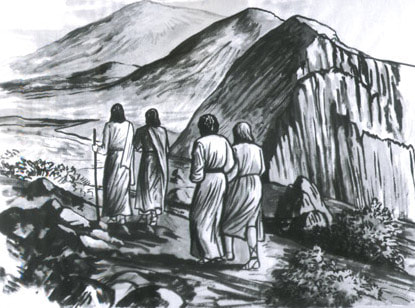

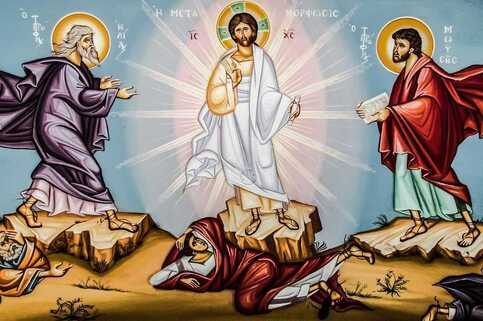
















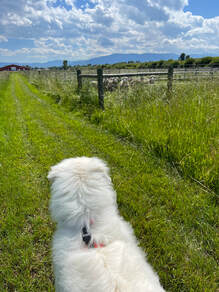
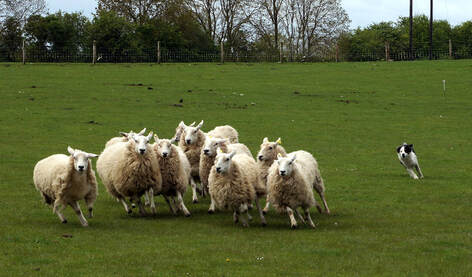
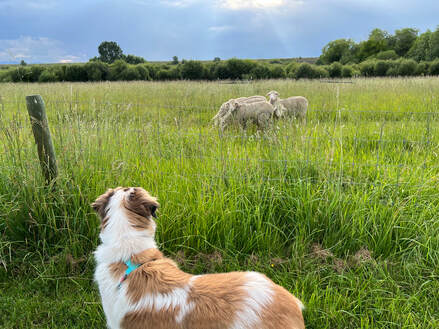

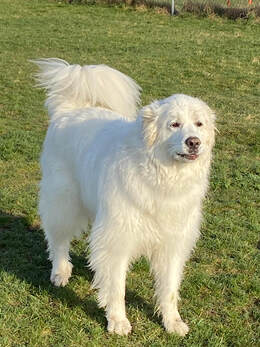
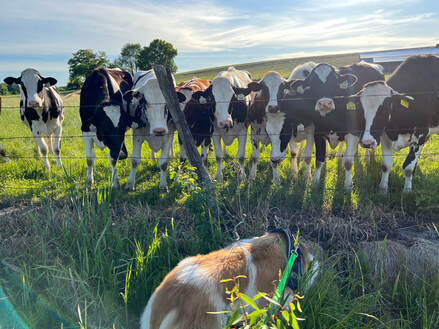

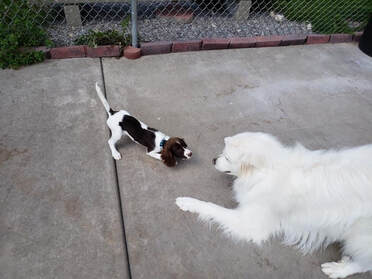


 RSS Feed
RSS Feed